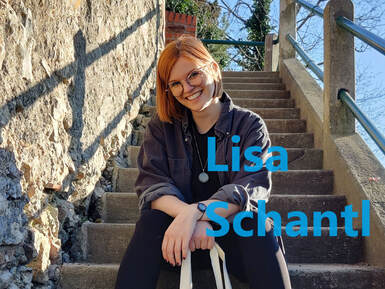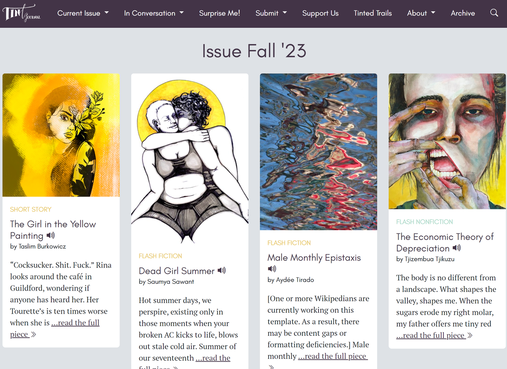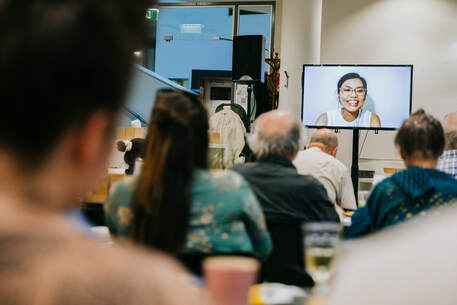|
I met Lisa Schantl through Saraband Book's Zine Lunch. She participated in my workshop in January. Later, I learned that she organized Tint Journal and asked me to join their creative community. Their printed literature anthology, Tinted Trails, is just available. Their publishing & reading events are around Graz in Austria.
"The idea for a literary journal with this particular focus emerged during my year abroad as part of my Master’s degree in the United States. The unquestioned and solitary reign of English in this country made me experience firsthand what it meant to face prejudices and unfair grading because of one’s non-native language background." - - Lisa Schantl All international students face this type of challenge. Some might get discouraged and abandon learning opportunities in English.
When I decided to enroll in the English Department for a bachelor's degree at Indiana University South Bend, one professor strongly rejected my application. She visited the department and asked them not to allow me to study further in advanced English classes. Her reason was that my grade from an elementary level Shakespear class was questionable (I agreed that the grade was not good). However, I was also not able to accept a "strong rejection" as a reason for failure as an international student who came to America and wanted to study English literature, culture, and writing. Eventually, the application reviewers and the international office had a meeting, and they denied her request. I had to take private lectures for better understanding western literature with Dr. Eileen Bender. She passed away, but it was fun to discuss books with her, including children's books by Roald Dahl. Also, it was my first-time discussing art in English. I had a fantastic two years in graduate school at Indiana University South Bend. "I hope that our situation – and the situation of similar projects – will improve for the better as our world becomes even more connected and more aware of the importance of bridges and in-between zones." - - Lisa Schantl It is so rare for someone to utilize their experience as an international student to create a journal for the ESL worldwide community like Schantl. I hope that many ESL writers receive encouragement from Tint Journal and make their English writing careers blossom. It is a long journey to be published for ESL writers. But - - you are not alone - - Schantl, myself, and WE are paving our way together for each other. "Tint Journal is the first online literary journal with an explicit focus on writers who produce creative texts in English as their second or non-native language." Could you introduce Tint Journal to our readers?Tint Journal is an online literary magazine for writers who choose to compose their short stories, poems or creative nonfiction pieces in English as their second or non-native language (ESL). Since its beginnings in 2018, more than 200 writers from over 70 countries have been published in its digital pages, covering a wide range of genres, styles and voices. In addition, we regularly share interviews with and reviews of books by ESL authors in our In Conversation section. Currently, our 5-year-anniversary publication is in focus: the print anthology Tinted Trails which will be out in November 2023, showcasing 35 texts by just as many ESL writers from various places and at various stages in their writing careers. Why did you create this ESL literature community?The idea for a literary journal with this particular focus emerged during my year abroad as part of my Master’s degree in the United States. The unquestioned and solitary reign of English in this country made me experience firsthand what it meant to face prejudices and unfair grading because of one’s non-native language background. In a world marked by geographic and cultural movement, in which forced and voluntary migration happen on a daily basis, the language that one has grown up with speaking will probably not be the only language one ever speaks. Some people might even use a language they have learnt later in life with a proficiency gravely exceeding the level of their ‘mother tongue’. Still, the idea persists that the only language one was supposed to creatively express themselves in was your first language. Tint Journal is one of many ways to counteract this assumption and raise awareness for the linguistic empowerment that comes along with the right to find a voice in a language of one’s own choosing. Could you tell us more about the journal process?Tint Journal appears in a biannual rhythm, with open calls in the months of April/May and October/November. Since English is the world’s most spoken second language, we receive a high number of submissions per open call while only being able to publish about 25 texts per issue. This selection is the result of a careful review process conducted by Tint’s main editors – John Salimbene and I for poetry, and Matthew Monroy, Andrea Färber and I for prose. As a journal publishing writing from various cultures and traditions, we do not only consider aspects such as voice, plot, and linguistic competence, but we also pay attention to style, content, and language background, to curate issues with texts that represent the diversity of non-native language writing and still work well with each other. One feature that we are proud of is our in-depth editing. Our main editors as well as further assistant editors (by now we’re a group of 13 volunteers) are paired with the authors to discuss grammar and syntax as well as issues especially relevant to non-native language writing, such as the use of idioms, the embedding of foreign language terms, and the allusion to culture-specific narratives. The backgrounds of the volunteers engaged at Tint Journal are just as diverse as the authors we publish, and we try to support the authors’ unique voices as best as we can. What are you hoping for next?Carrying out a literary project that extends beyond borders and cultures is rewarding just as it is challenging. Due to Tint’s transnational character, funds are hard to get and the only way we have been able to stay active over the past years was through volunteer work and without paying neither the writers nor the artists. I hope that our situation – and the situation of similar projects – will improve for the better as our world becomes even more connected and more aware of the importance of bridges and in-between zones. There is only one way to move forward, and that is with an open mind and respect for everyone and everything on this planet. I hope that Tint Journal can make a small but valuable contribution on this route. Lisa Schantl is the founder and editor-in-chief of Tint Journal, and an assistant at treffpunkt sprachen at the University of Graz where she also researches translingual literature. In addition, she freelances as cultural organizer and translator. She studied English and American Studies as well as Philosophy at the University of Graz and Montclair State University, New Jersey. Her writings and translations have appeared in Asymptote, manuskripte, PubLab, The Hopper, The Normal Review, UniVerse, Versopolis and more. She has received various grants and scholarships, most recently the KUNSTRAUM STEIERMARK scholarship for 2023-24. Support Working on GalleryYour $25 donation will be a tremendous support for Working on Gallery's future guests and running costs. If you become a patron, your name will appear in the next Working on Gallery's article. In addition, you will receive my first poetry book, "Where I Was Born", for U.S. shipments. Or, you will receive a thank-you letter for international shipments. Working on Gallery has been used by universities, advanced-level art lectures, and writing workshops. Your donation will help this gallery be more successful. Thank you so much - Naoko Fujimoto |
Archives
July 2024
|
フジハブ
Welcome to FUJI HUB: Waystation to Poetry, Art, & Translation. This is not your final destination. There are many links to other websites here, so please explore them!
Welcome to FUJI HUB: Waystation to Poetry, Art, & Translation. This is not your final destination. There are many links to other websites here, so please explore them!
What are you looking for?
FUJI HUB Directory
Popular Sites:
Gallery of Graphic Poems
Working On Gallery
(Monthly New Article by Writers & Artists)
About Naoko Fujimoto
Contact
Naoko Fujimoto Copyright © 2024
FUJI HUB Directory
Popular Sites:
Gallery of Graphic Poems
Working On Gallery
(Monthly New Article by Writers & Artists)
About Naoko Fujimoto
Contact
Naoko Fujimoto Copyright © 2024







